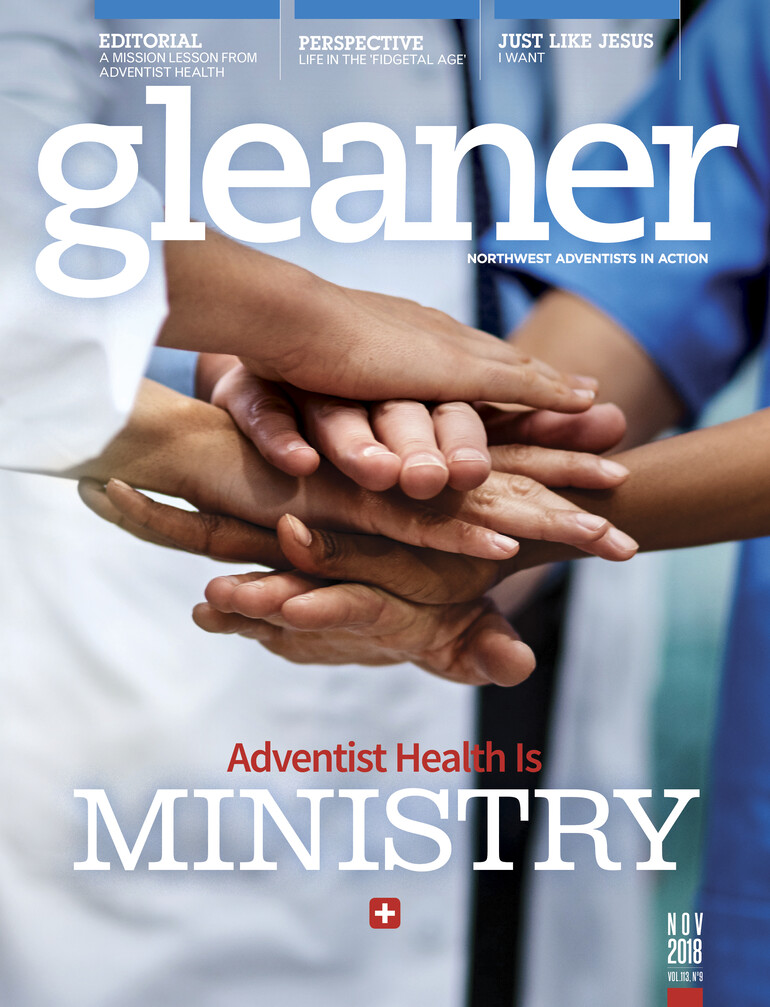Throughout childhood, I suffered guilt and despair despite sincerity of spiritual caregivers. Church school teachers warned that only perfectly Christlike children qualify for heaven. While God also loves imperfect people, they would be lost in heaven’s investigative judgment — which any moment could determine our doom. "But if you pray every day,” pastors added hopefully, “Jesus will come into your heart and cleanse you from all sin.”
Somehow sanctification didn’t happen as advertised.
One day a courageous pastor's wife notified my mother that I was “chubby.” She shared quotations that threatened my salvation if I didn't lose weight. Eventually, my adolescent growth spurt eradicated baby fat but initiated other temptations. Academy teachers admonished us teenagers, "Why be lost when salvation is free? You can't buy it or work for it. The grace of God that changes your heart is free!"
Free indeed! I actually wished salvation were not free. I would sell my soul to God in exchange for peace. But no, salvation was free — like moon dust, far beyond my grasp.
While a sophomore at Columbia Union College (now Washington Adventist University), I redoubled efforts to Christify myself. That summer I sold Christian books, returning my junior year as a theology student.
Just when sanctification seemed attainable, I plunged into great disappointment. It happened Oct. 22, 1971, at a student ministerial retreat. The speaker from a self‑supporting school declared we must reflect the image of Jesus fully to survive the impending Time of Trouble. Drawn like a moth to the flame of his perfectionism, I fled my Christian college that permitted sports and dating. Flushing all friendships, I joined that self‑supporting institution in the mountains, 20 miles from the nearest temptation.
Home at last! Earnest leaders with firm handshakes welcomed me to wholesome, godly living. No ice cream, TV or newspapers — nothing but the books of Ellen White and the Bible.
Elusive sinlessness
Survival was a struggle. Mornings I hand-cranked the old John Deere tractor and worked the farm. Afternoons I sold books on dusty country roads. Evenings and weekends I conducted Bible studies.
After one year at that Adventist madrassa, everyone regarded me the strictest jihadist among them. A fanatic, they called me. All I did was take their perfectionism to its logical conclusion. Yet nothing I could do relieved suffocating guilt — not from bad habits unconquered, just the haunting reality of chronic imperfection.
One Saturday night, as I knelt beside my army cot, grief and frustration overwhelmed me. "God, what does it take!” I cried. “I've given up everything You could possibly want. I've forfeited all fun, scholarships and even my dream of pastoring. I'm all alone out here. My class back at college graduates this spring, and I'm stuck on this wretched farm where nobody loves me, nobody cares." Hot tears cascaded on my Bible.
"They call me a fanatic, Lord. But all I do is only what You want me to — and still it's not enough. God!” I cried. “Long ago I ‘let go and let Jesus’ have my life. I live by faith in His justifying, sanctifying grace. What does it take to perfectly reflect the image of Jesus? When will I be ready for heaven?"
How long I spent sobbing, I don't know. Next morning I awoke still on my knees, determined to fast and pray more fervently for a closer relationship with Jesus.
Thanksgiving Day 1973, the cook prepared an abundant holiday dinner. While the others feasted, I fasted. Climbing the mountain behind the institution, I prayed nobody would overeat and defile their body temple. But my stomach growled with resentment about my comrades eating without guilt. So fasting left me worse spiritually than if I had enjoyed Thanksgiving dinner.
Desperate for a final solution for total sanctification, I sought to pray without sleeping, night by night pursuing post-midnight perfection. Finally I realized it was time to evacuate that institution. In 1974 I persuaded the most fanatical woman there to leave and marry me (without going out on a single date). I didn’t feel physically or romantically attracted to her, but we labored together for God’s kingdom like James and Ellen White did.
Miraculously, Darlene and I just celebrated our 44th anniversary. Our son’s birth in 1976 was transformative; holding him in my arms flooded me with fatherly love that exposed a lifetime of legalistic lies about my heavenly Father. I discovered that “where the Spirit of the Lord is, there is liberty” (2 Cor. 3:17), and I’ve had opportunity to teach grace-based ministry to pastors around the world.
Free from guilt and fear through the death and resurrection of Jesus, we rejoice in the Spirit of adoption, by whom we cry, “Abba! Father!” (Rom. 8:16). We begin each day praising the Lord together for rescuing us from legalistic darkness into His marvelous light.










